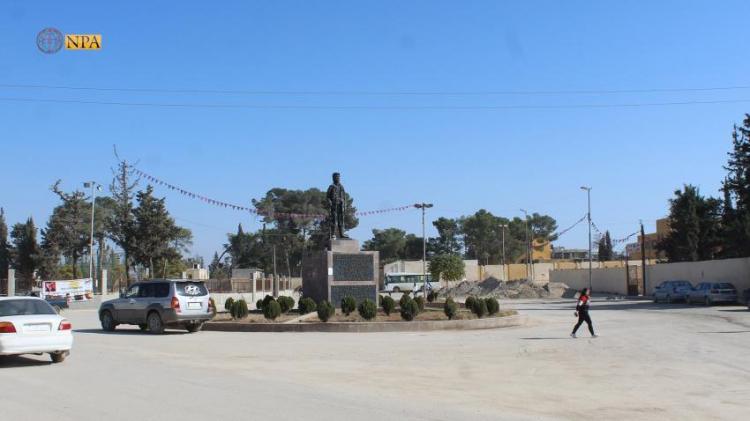Humanitarian organizations in Kobani resume their works, amid difficulties caused by Turkish invasion
Kobani – North-Press Agency
Fattah Issa – Fayyad Mohammad
Most foreign and local humanitarian organizations are facing difficulties in their works in the Euphrates Region due to the ongoing Turkish military invasion and its affiliated armed opposition groups in northeastern Syria.
The blocking of the international highway M4, also locally known as Rodco road, by Turkish affiliated armed groups, is the biggest obstacle to the work of the humanitarian organizations which are forced to change their course and travel long distances in order to deliver aid and relief supplies to the displaced people.
The impact of the invasion on organizations
Ahmad Sheikho, the coordinator of Doz Organization in the Euphrates region told North-Press that, "The Turkish invasion on northeastern Syria has greatly affected the projects which their organization is implementing in the region, where the Turkish invasion led to the separation of the city of Kobani from al-Jazira region, which affected directly the working program of the organization and its projects in the region.
Sheikho explained that, they had many projects in progress, including service and other projects in the protection, education and capacity-building sectors, but they were stopped due to the Turkish military invasion and the changing in the situation in the region.
Sheikho added that, their organization, which was working in the field of civil society, moved to work in the field of humanitarian relief because of the increase in the number of displaced people coming to Kobani and Hasakah.
Together with other humanitarian organizations, "Doz" is currently preparing statistics on the numbers of IDPs and their needs assessments to implement projects to support them under the supervision of the Office of Humanitarian Organizations in the Euphrates region.
The biggest obstacle
In turn, the project supervisor of "Kobani Relief and Development Organization", Sherzad Mohammad explained that, the biggest impact of the Turkish invasion on the works of the organizations is related to blocking the international highway M4 between Kobani and Qamishli, because all the needs and requirements of the organizations come from al-Jazira region. Also, blocking the road led to the cutting off the direct communication and coordination between the organization and its supporters in al-Jazira region.
Stopped supporting the poor
Mohammad stated that, they had several projects during 2019-2020, one project was only implemented, which is delivering wheat seed and fertilizer to 229 people, while the second project which was "livestock project" was stopped, which was hoped to benefit about 100 poor families.
The third project, "money for work project", which would have provided jobs for about 100 people for two months with a salary of $7 and $9 a day, in addition to planting 2,000 trees in the city and maintaining the gardens there.
"Kobani Relief and Development Organization" has been working for more than three years in development projects, where 90% of its projects were related to the development of the agricultural field, but due to the Turkish invasion in the region, the organization developed an emergency plan and went to provide first aid for the displaced people coming from the cities of Sere Kaniye (Ras al-Ain) and Tal Abyad (Gire Spi).
For his part, member of the Office of "Humanitarian Affairs in the Euphrates Region", Khalil Muslim told North-Press that, the number of the humanitarian organizations working in Kobani is 17, including 11 foreign organizations and 6 local ones, pointing out that these organizations are continuing their work in Kobani district, but they stopped their work in the district of Tal Abyad because of the Turkish invasion, and most of the foreign employees of the foreign organizations left the region, while the reliance in the work of these organizations remained on the local cadres.
Relief field
Muslim said that, foreign and local organizations were previously working in the field of development, infrastructure and psychological support projects, but turned to work in the field of relief because of the increasing number of the displaced people coming to the region as a result of the Turkish war on the region.
He pointed out that the difficulties facing the works of the humanitarian organizations related primarily to the blocking of the international highway M4, where most of the aid and logistics come across from Kurdistan Region Government, so cars and trucks are forced to change their route into remote roads to avoid the Turkish bombardment, and to reach the region safely.

